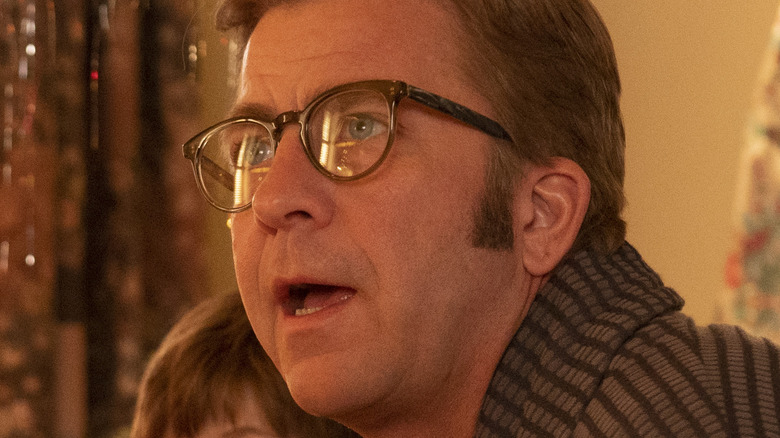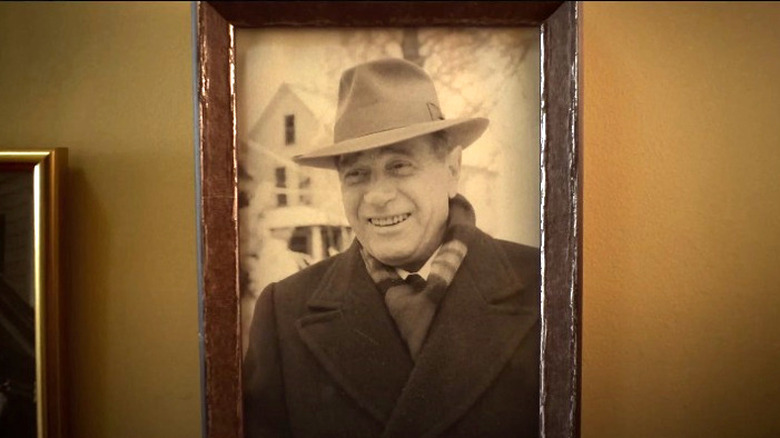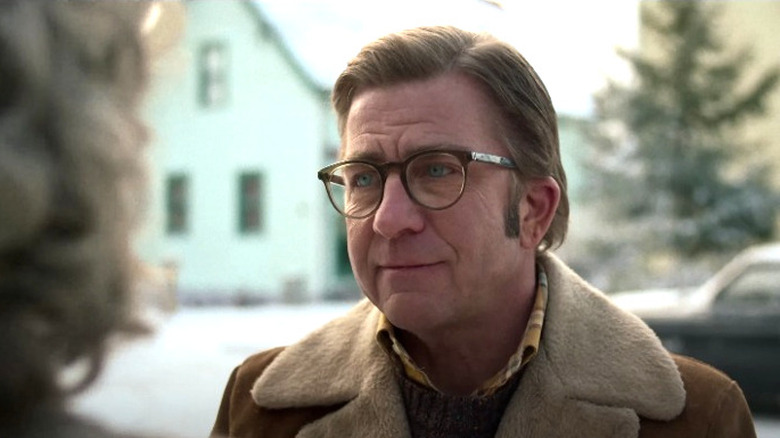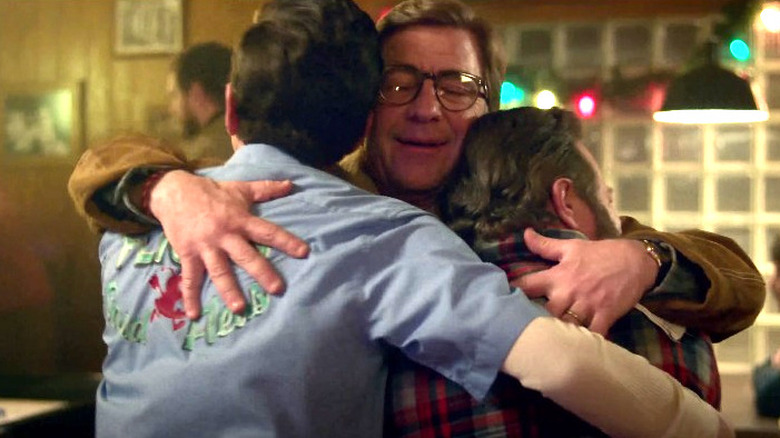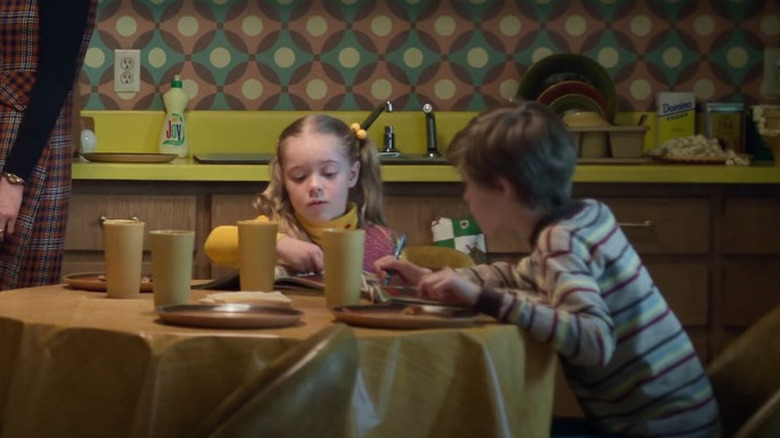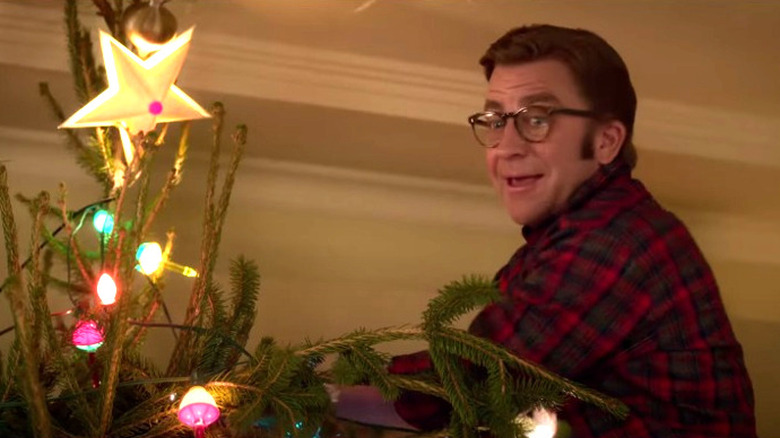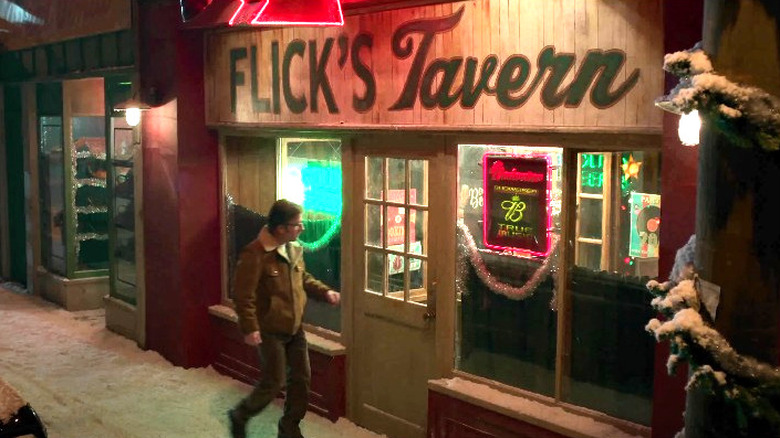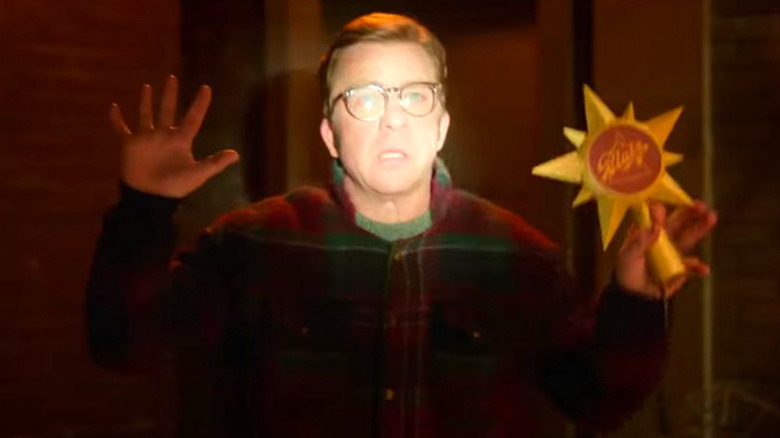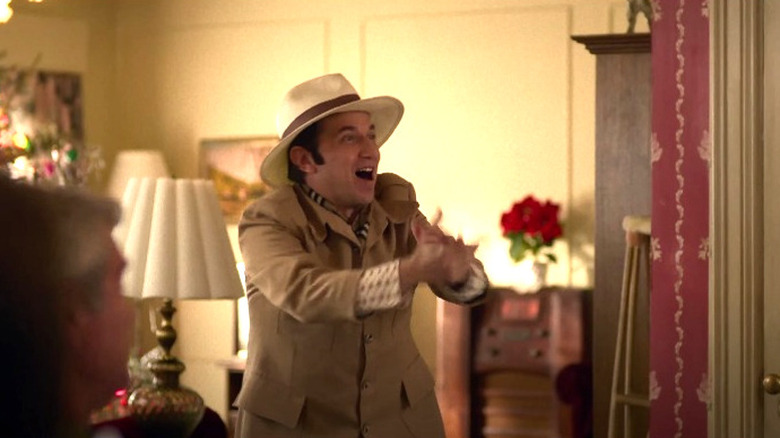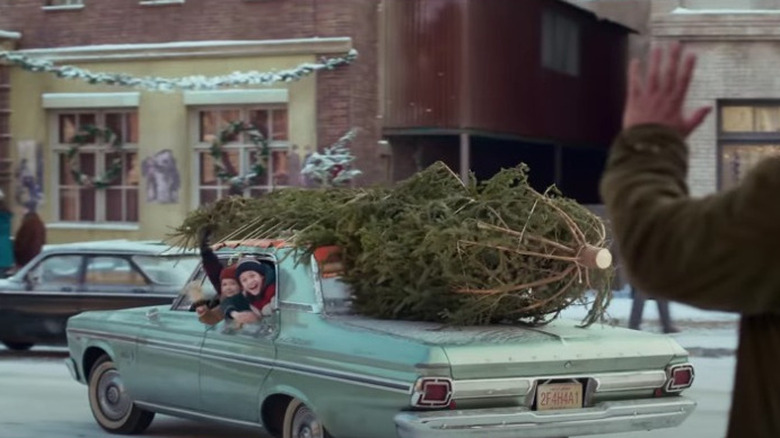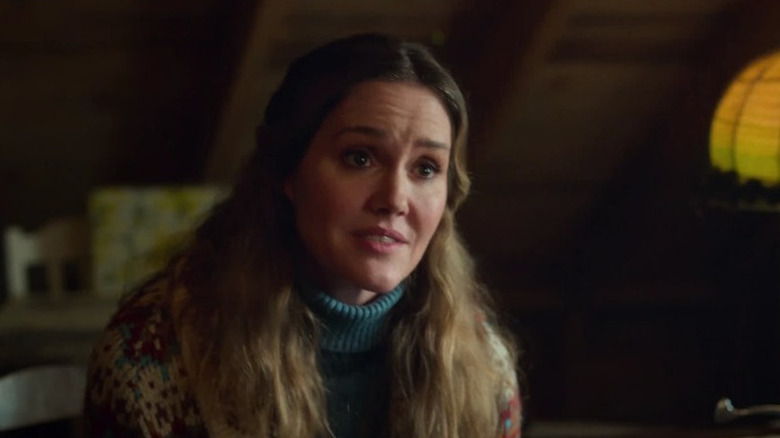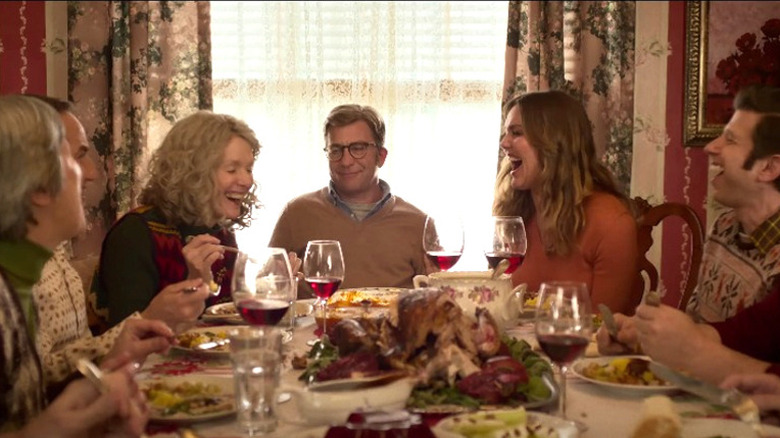The Ending Of A Christmas Story Christmas Explained
"A Christmas Story Christmas" has the unenviable task of living up to the impossible standard of its predecessor, "A Christmas Story," without coming off as just another pale attempt at capturing the magic of that all-time holiday classic. Other follow-ups, like the PBS-produced films "The Star-Crossed Romance of Josephine Cosnowski" and "Ollie Hopnoodle's Haven of Bliss" managed to be fairly entertaining, if forgettable, while "It Runs in the Family" (aka "My Summer Story") and "A Christmas Story 2" failed to ignite much enthusiasm.
What first sets this sequel apart is the fact that much of the original cast has returned, and the new additions fit in right alongside them. But the movie also actively engages with the concept that no sequel can ever live up to the original by having Ralph Parker (again played by Peter Billingsley) trying to replace his late father, only to seemingly fail in the process. It's almost as though director Clay Kaytis and his writing collaborators (including Billingsley himself) knew there was no way to be as good as the original, so they decided to make a movie about that very thing.
Let's discuss the various themes and plot elements that went into creating that message so that, just in case you didn't pick up on it the first time, you can watch it again with a new perspective.
The Old Man
He was loud, had a short fuse, and loved to curse, but Ralph Parker's father (referred to as "The Old Man") was, in some ways, the heart of the original film. On the outside, he appeared to loathe all the headaches that came with Christmas, but when the magical day finally arrived, he always delivered. If Christmas could warm The Old Man's heart, it should be able to win over anybody.
Like the role he played, superb character actor Darren McGavin is irreplaceable. Sadly, he passed away in 2006, so instead of trying to recast him, they made the wise choice of having the character's passing be the spark that sets the plot of "A Christmas Story Christmas" into motion. Without The Old Man around, is it even possible to have a good Christmas?
Despite all the stress he's already under, a now adult Ralph Parker gives it his best shot. Almost everything goes wrong, but in the end, his family ends up having a perfect Christmas all their own. Of course, a major contributing factor to this is the fact that The Old Man buys everyone the perfect Christmas gift (just as he did in the original) before his passing. It's a reminder that even if this movie isn't the same as the original, the heart of that first movie is still there and its memory will last forever.
Bittersweet holidays
There is a naivete to Ralph's character in the first film that doesn't carry over to the sequel. It's not that Ralphie was delusional in any way, but he was just a kid. So although his parents were obviously struggling financially, he still had the wondrous holiday sparkle in his eyes. To him, a lack of money wouldn't put a damper on the holiday, but not getting that BB gun would. He was so single-minded about it that everything else fell by the wayside.
That's not the case in "A Christmas Story Christmas." There is a bittersweet flavor to everything in the film. Obviously this is instigated by the death of The Old Man, but a lot of it has to do with the fact that Ralph isn't a little kid anymore. He's a grown man with a wife and kids and responsibilities. He's trying to make it as a writer, but the deadline he has given himself is quickly approaching and he still hasn't been published.
That maturity goes a long way in helping this film (and Ralph himself) stand on its own legs. The film could have easily been nothing but callbacks and references (which it has plenty of), but the overall focus is on trying to break away from that while still honoring the past. Learning to accept that he isn't his father (and that this isn't "A Christmas Story") is the arc of his character, the film, and us as an audience.
Just like old times
The fact that Ralph is spending Christmas in his hometown means he gets to see his old friends Flick (Scott Schwartz) and Schwartz (R.D. Robb). This is an excellent excuse to reference things like Flick's tongue sticking to the flagpole on a triple dog dare, but it's more than that. But it's not like these guys are just sitting around rehashing old times. They've got their own stuff going on: Flick owns a bar and Schwartz runs an expensive tab at that bar. As characters, they've been allowed to grow and change.
Ralph starts to fall back into the groove of spending Christmas with the people who mean the world to him. As he points out when he takes his kids to stand in front of the window at Higbee's department store, the old ember of Christmas is beginning to glow inside him.
It reminds us that no matter how much time goes by, no matter what problems we have, we can always appreciate where we've come from and what we've accomplished. Yes, Ralph has a family now and he no longer lives in Mohman, Indiana, but the love is still there. Seeing his friends and sharing an old family ritual with his kids wakes that up in him, and it signals to the audience that change doesn't have to be such a bad thing.
No casserole left behind
Following the death of The Old Man, the Parkers are inundated with casseroles by friends and neighbors hoping to help them grieve. Unfortunately, these casseroles are bizarre concoctions that Ralph's kids are understandably skeptical of. In Ralph's narration, he points out the fact that no one wastes food in his mother's home. While this is a funny character quirk, it actually fits in with who Mother Parker (this time played by Julie Hagerty) is.
If you recall, "A Christmas Story" takes place in 1940, which means the Parkers suffered through the Great Depression. It's likely that, by the 1970s when "A Christmas Story Christmas" is set, Mrs. Parker is still carrying the survival instinct to make sure no food goes to waste. Thus she tells her grandchildren that they will not be able to indulge in the traditional Christmas dinner until the casseroles are gone.
There's a symbolic aspect to this as well. The casseroles are meant to aid in the mourning process. When Larry Novak (played by Henry Miller) finishes the final bite of the final casserole, this signifies that the time for mourning is done and the family can dig into the turkey, as a form of acceptance of The Old Man's death and celebration of his life.
It's not Christmas without a star
After Ralph gets a new tree for the family (that's way too big for the house), he retrieves the Christmas decorations from the attic to start setting everything up. His daughter Julie (Julianna Layne) isn't sure how she feels about the decorations since there is a star at the top of the tree rather than the angel she's used to. Ralph quickly improvises an explanation by telling her that in this part of the country, it isn't Christmas without a star and Santa won't even show up without one on top of the tree.
The store Santa later confirms this for her, so she is devastated when the star falls and shatters near the end of the film. Not only does Ralph's explanation set up the climax of the movie, but it is also a moment where he begins to hold his own as the leader of the family. Without even realizing it, he's stepping into the role previously held by his father, but doing so in his own way, which plays into his transformation at the end.
A light in the darkness
After his mother tells Ralph that she would rather he put all of his efforts into making Christmas special for everyone, the pressure of that gets to him almost immediately and he needs to get away for a while to clear his head. As he walks the streets of Mohman, he finds salvation below a sign reading "Booze." It's Flick's Tavern, and Ralph ducks inside to have a drink, reconnect, and procrastinate.
The bar comes to his rescue again after he shatters the Christmas star. Again, overwhelmed and desperate for hope, Ralph searches the streets of Mohman, only to find closed and locked doors. Then, in the darkness, he sees the light of a Christmas star poised atop a tree in Flick's bar. It might be slightly gauche to adorn your Christmas tree with the logo of a beer company, but as Ralph points out (much to his chagrin), it's the thought that matters. He told his daughter it wouldn't be Christmas without a star, so he gets her a star.
Besides, while he's out, his mother discovers the treasure trove of presents The Old Man got everyone, so who cares if the star's promoting beer?
The Farkus affair
After Ralph successfully breaks into Flick's Tavern and emerges with the stolen star, the fuzz is there to stop him. Not just any fuzz, either, but a cop with yellow eyes. That's right, Zack Ward is back as the bully everyone loves to hate: Scut Farkus. This is perhaps the real turning point of the film, the moment that signifies to Ralph that times really do change and that's okay.
He naturally assumes that Farkus is still up to his bullying ways because his kids have picked up the baton from where he left off. Not only that, he's pretty sure Scut wants revenge for the beating Ralph gave him all those years ago. Farkus plays into this, by slowly driving him through town, making him think that something terrible's going to happen. However, he actually gives him a ride home.
Not only that, but he apologizes for the terrible things he did as a kid and tells him that the pummeling he took that day back in 1940 made him reconsider his choices and inspired him to become one of the good guys. He tells Ralph that if any other cop had answered that call, he'd spend the weekend in jail — signaling that a lot of things change with time, including people and their expectations.
A cracker, huh?
There's one member of the Parker family missing for most of the film and that is Ralph's kid brother, Randy. Just when you find yourself wondering why he wouldn't be there to grieve with the rest of the family, Ralph gets a telephone call from Randy (played by Ian Petrella), who is living in India. As the film points out, it isn't all that easy to travel to Indiana from India, but Randy doesn't seem to be making much of an effort.
In order to make sure his brother makes it for the holiday, Ralph lies to him about their mother's emotional and physical state. He tells Randy that she is only able to eat a cracker and the only word she's able to muster is "Randy." It's a dirty tactic, but it works. In the final moments of the film, Randy arrives and everyone is thrilled. Their mother is so happy that Randy looks at Ralph and says, "A cracker, huh?"
Randy recognizes his brother's ruse but instantly forgives him. Ralph is tasked with making this a great Christmas for everyone, and he can't do that without his brother. They need to have the whole family together.
Radiator breakfast
Just like The Old Man, Ralph has trouble with his car. Nearly every time they go anywhere, the radiator overheats, and Ralph is forced to crack an egg in it to temporarily solve the problem. Julie even asks Santa to bring her a radiator for the car, which he says he can't do. On their way back from the store, Ralph discovers he is out of eggs, so the family is forced to hang out and wait for the engine to cool off. To pass the time, they have a snowball fight, which results in Ralph mistakenly clocking his daughter Julie in the eye with a snowball.
Later on, Julie finds a stray puppy belonging to the Bumpus clan and only agrees to return it if they give her a radiator from one of the many junkers sitting in their yard. At the end of the film, when everything is finally going right, Julie gives her dad the radiator. Not only does this prove that his kids are just as concerned with making Christmas special as he is, but it also insures that Julie will never have to take a snowball to the face while they wait for the radiator to cool down again.
Write what you know
Ralph has always been very imaginative. You see it in "A Christmas Story," with all those fantasies of how his parents would feel if he went blind from soap poisoning or how he could take on Black Bart and his gang with his BB gun. That creativity carries over to "A Christmas Story Christmas," with fantasies about a rematch between himself and Black Bart and how getting arrested for breaking and entering could ruin his family's lives.
Unfortunately, he isn't able to parlay that into a fruitful writing career. He's writing massive science fiction manuscripts, but nobody is biting. Then he's tasked with writing his father's obituary and struggles with summing up a man's life in a paragraph. His mother tells him all he needs to do is write about the man he knew, which inspires him to write the story that will later become "A Christmas Story."
His wife Sandy (Erinn Hayes) finds the story and sends it to the local paper. When it's published, the whole town reads it and tells Ralph how impressed they are. This is another example of how Ralph doesn't need to be anything more than who he is. By writing about his own life, he's able to connect with people. This is fitting, since "A Christmas Story" was based on the writings of Jean Shepherd, which were inspired by elements of his life.
The perfect Christmas
In the end, Ralph tries everything he can to live up to the impossible standard set by his Old Man. He wants to create a Christmas that will be just as memorable as the one he experienced in 1940, which he refers to as the gold standard. His memory of that time is a little confused, however. That Christmas was plagued by fights, heater problems, jealousy over a leg lamp, and dinner being ruined.
The reason that year resonates so well is that despite all the misfortune and arguing, everyone came together on December 25 to share love and joy in the face of hardship. Ralph thinks he's screwing everything up now by not making everything as perfect as The Old Man, but what he doesn't realize is that he's more like his father than he knows. When he stops trying to be his dad and just does things his way, everyone comes together and has a wonderful time.
The same is true for the movie. In the final moments, we see Ralph occupy his father's chair, signifying he has finally accepted the mantle. As he reads his newly published story to his family, we see clips of the original "A Christmas Story." These images aren't solely there to pull on our nostalgia strings: they remind us that the original will always be there, just like the memory of The Old Man.
